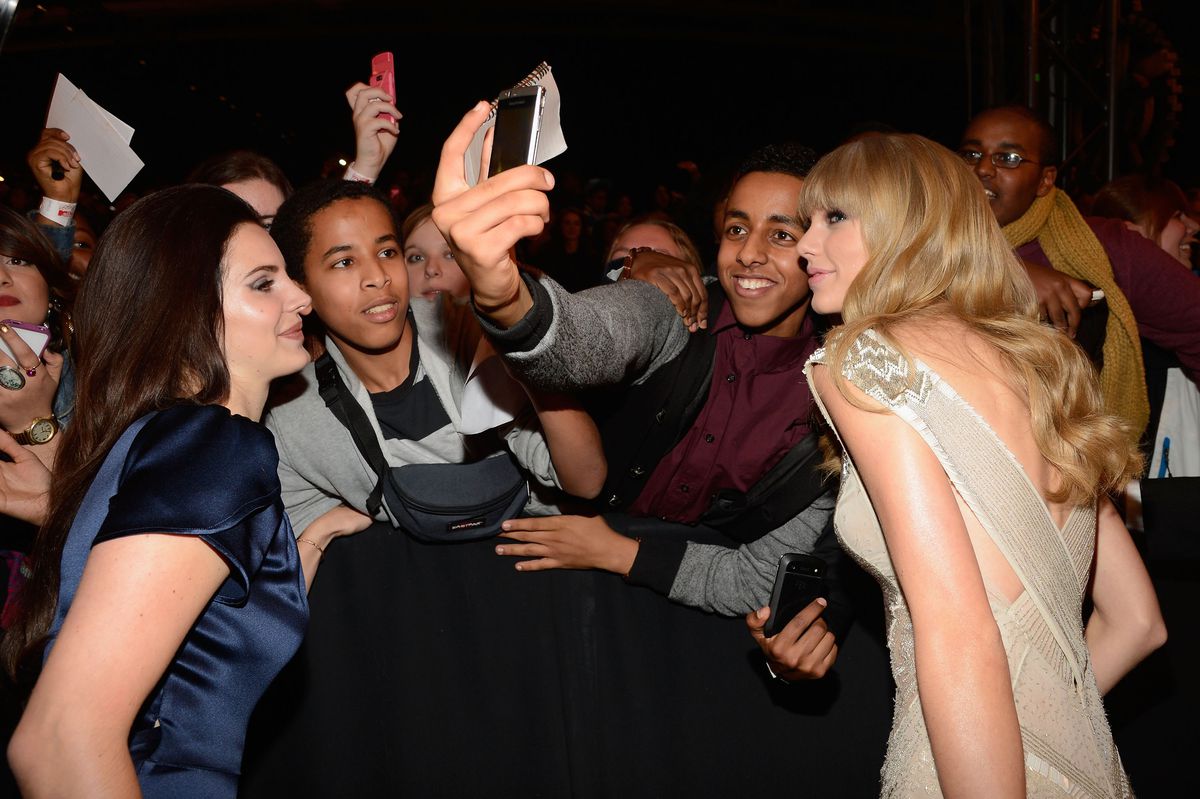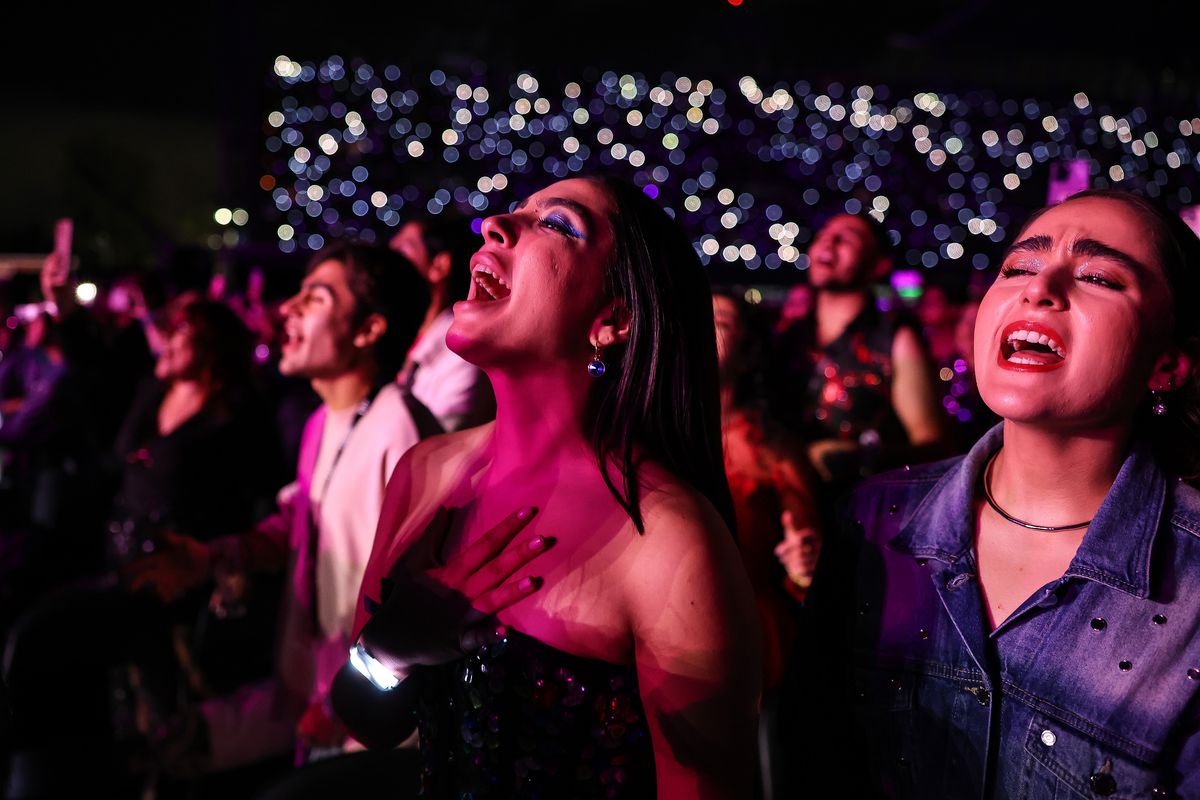Everyone knows Taylor Swift, one of the world’s biggest pop stars, but only a select few know what she’s really thinking. Much like an Instagram story that’s secretly meant for a crush, Swift is always subtly putting herself out there, hoping you’ll notice. At least, that’s how fans tell it. For these fans, “Mastermind” isn’t just a single off her new album — it’s Swift’s entire modus operandi.
Just in the last few months, fans have claimed that Taylor Swift was writing a memoir (she wasn’t), writing a play (she isn’t), and, if that weren’t enough, she’s apparently orchestrating the world’s most elaborate coming-out moment (TBD). You might even believe that Taylor Swift is the world’s best English teacher after witnessing fans debate the hidden meaning of a single punctuation mark. These signs — Swift subtly signaling her next career move, or giving fans windows into her personal life via code — are everywhere, and the “proof” gets millions of views on TikTok every day. At this point, Swift’s leaning into the appetite for secret codes: Last week, she tasked fans with solving 33 million Google puzzles before she revealed the five vault tracks for 1989 (Taylor’s Version). The game was such a resounding success that fans briefly broke Google.
It’s easy to tie this obsessive brand of fandom to the fact that Taylor Swift is, in 2023, surpassing her existing supernova-level stardom. With the Eras Tour, she’s fueling entire economies. She’s starting earthquakes. Her historic tour has been posted thousands of times to TikTok, whose adroit algorithm brings fans together with the force of the Large Hadron Collider. And the more fans speculate, the more headlines she gets, and the more demand there is for her tour. The pre-orders for Swift’s Eras Tour movie broke records the same weekend that Cosmopolitan published a feature on the summer camp for people who believe Swift is queer. But the quiet plotting — or at least fans’ perception of it — has defined Swift’s entire career.
The start of Taylor Swift’s endless ciphers

Early on, back when everyone still bought CDs, fans treated liner notes like scripture. Fans who looked closely at things like capitalization in her first album from 2006 found Easter eggs ranging from furtive commentary to discovering the inspirations behind their favorite songs. The move, while crude in its liner note execution, primed fans to expect more than witty lyrics from her, paving the way for internet obsessives in the years to come. Infamously the fandom got carried away examining a photo of her from 2019. Devotees thought they saw a pattern in the background of Swift’s Instagram uploads, eventually concluding that seeing five holes in a fence of the photo was evidence of a grander scheme.
Nothing was happening, of course. But why let something like the truth stop you from having a little bit of fun?
Rather than be discouraged, self-aware fans call this phenomenon clowning. “Being wrong is what makes being right worthwhile,” says Ty Wilson, a fan who built a platform on TikTok by describing a cinematic universe that connects every single Taylor Swift music video. While most theories are far-fetched, some turn out to be true. Recently, fans figured out that Swift was going to announce a new re-recording of an album after noticing aberrations in the musician’s concert outfits. Hell, fans knew she was going to announce 1989 before she officially revealed it; they’d caught Swift sneaking the album title into a few music videos that premiered during her tour. Being a Taylor Swift fan has a surprising amount of overlap with players of alternate reality games, which purposefully hide Easter eggs in the real world to create mind-bending puzzles.
“It’s basically throwing everything at the wall and seeing what sticks, because nobody but Taylor really knows what’s a real egg and what is just coincidence,” Ty mused. “But if you are lucky enough to get one right, it just makes you want to look for more.”
While the conspiracy theories sometimes read like something out of QAnon, they’re often blanketed by literary analysis of figures like Emily Dickinson and curious historical facts about queer art, like that of Dusty Springfield. Fans will earnestly argue that Swift spent an entire weekend during her tour memorializing a secret queer love affair, sure, but most big content creators will do it with some self-awareness.
“I try not to put too much stock in any [theory] because they usually lead to disappointment,” says Bryanlicious2, a TikToker known for funny Taylor Swift content that often lovingly pokes fun at the fandom and how it gets carried away. “But it is a nice feeling of community when we’re all disappointed together.”
Taylor Swift isn’t your close friend, but she’ll make you believe she is

Even when the gossip goes beyond the realm of possibility, there’s plenty of reason to keep clowning. Rather than scold fans about “holegate,” Swift joked about it on Tumblr. She debunks fan theories about her own albums on stage, and off stage, Swift responds to fan videos as well. Swift might travel with a caravan of security in 2023, but she’s maintained the appearance of being grassroots. It’s characteristic of a growing artist, not someone who is at the very top of the music industry.
“People like to think Taylor is always online and watching because over the years she has deliberately cultivated that illusion,” says Georgie Carroll, an Australian expert who recently completed a Taylor Swift-focused Ph.D. “Especially in the pre-COVID years, she would like posts on Twitter or Tumblr, or send fans messages through various platforms, and when she met them at secret sessions she would ‘know’ facts about them that they had shared online.”
Doing things like inviting everyday fans to hear an album before it’s released is part of a larger tactic Swift often uses to compress her stardom into something less daunting for anyone who interacts with her. Swift is a masterful engineer of her own celebrity: She signals that she’s apparently too big to perform at the Super Bowl, only to shatter the image of that Grammy-winning colossus by baking fans cookies. She can at once be the titan holding up the music industry while also being the girl that would probably be your friend, if you only knew her IRL. That parasocial element is key to why fans feel so strongly about her, and why they obsess over what she might do next.
“She’s been super clever in creating this reputation because it does a lot of her marketing work for her,” Carroll says.
And the marketing machine is constantly running. Swift is maximizing her exposure via things like the MTV Video Music Awards — during which a cameraperson was dedicated to filming just her — during the same period she’s neck-deep in her project of re-recording older albums. Her public breakup with Joe Alwyn this year is appended with the release of a gut-wrenching song spilling how the love died. Sure, you’ll need a ticket for her latest concert, which is the only place where she’ll sell the CD. Even though tickets can cost upward of thousands of dollars, fans still feel lucky that they get to spend the money and see a show most people can’t get into. Yes, it might cost more to see Taylor Swift than paying your rent. But for fans who are willing to drop the money, feeling like Taylor Swift is confiding in you because you interpreted her exclusive Easter eggs is priceless.
It’s not a cynical process for most fans, though. For one, they’re not being forced to spend any money at all, and theorizing by itself costs no money. “Consumption is frequently tied to positive emotions, and if it makes fans happy to buy everything put in front of them, who are we to judge?” Carroll adds.
Swifties seeking community

The marketing works not just because it’s clever, but because Swift’s music is legitimately that good. Fans get invested in her confessional storytelling because it’s evocative. Recent albums in particular are built around the concepts of fictional characters who put to words the vicissitudes of the human experience — those inchoate feelings we can’t name, but endure all the same. Would renowned, credible acts like The National and Boygenius work with her otherwise? There’s a reason so many people have basically grown up with Taylor Swift, and she’s only gotten better over time.
“Music has power, and for a storyteller like Taylor, that power is unrivaled,” Carroll says. “It’s not just being a Taylor fan, it’s being connected to someone who has, in many ways, been a soundtrack to your youth and is a reminder of what it means to grow up and evolve.”
Wilson has experienced this musical connection firsthand. When his grandmother died of cancer, he found solace in Swift’s work; she has a song about a family member’s fight with the same disease, and another track about keeping the memory of her grandmother alive.
“I realized it was Taylor’s mastery of connecting through her lyrics that truly made me feel like her songs were speaking to me,” Wilson says.
As Swift tours, fans get a chance to evangelize, on places like TikTok, what people are missing when they reduce her work to catchy songs like “22” — and all the other things people don’t realize about the singer, like the possibility that she’s queer. Listeners who make and trade friendship bracelets and those who interpret her song lyrics on social media shift between gossip and veneration effortlessly.
“Fans feel a personal connection to Taylor’s art, beyond listening to her songs, or viewing her music videos,” says NikkiKing, a TikTok creator whose theories about Swift’s future work have reached millions of views. “It is an interactive, communal experience.”
For NikkiKing, who has spun a far-ranging theory about Swift’s supposed obsession with the number “112,” being right about Taylor’s next public move isn’t the point. Think of it as fanfiction, filtered through the words of one of the biggest musical superstars since The Beatles. The 112 thing might not be true at all. But the videos on her theories have resulted in friendships across the globe, she says.
“To clown is to imagine the possibilities of ‘what might be’; not always ‘what will be,’” NikkiKing says. “It creates a game that we play by remembering our favorite things! It builds community and it’s just fun!”
- SEO Powered Content & PR Distribution. Get Amplified Today.
- PlatoData.Network Vertical Generative Ai. Empower Yourself. Access Here.
- PlatoAiStream. Web3 Intelligence. Knowledge Amplified. Access Here.
- PlatoESG. Carbon, CleanTech, Energy, Environment, Solar, Waste Management. Access Here.
- PlatoHealth. Biotech and Clinical Trials Intelligence. Access Here.
- Source: https://www.polygon.com/23887372/taylor-swift-easter-eggs-broke-google-eras-1989-taylors-version
- :has
- :is
- :not
- :where
- $UP
- 150000
- 2006
- 2012
- 2023
- 3000
- 33
- a
- About
- about IT
- across
- acts
- Adds
- After
- AIR
- Album
- albums
- algorithm
- alive
- All
- along
- also
- always
- amount
- an
- analysis
- and
- Announce
- Another
- any
- anyone
- appetite
- ARE
- argue
- around
- Art
- artist
- AS
- At
- audience
- Australian
- away
- back
- background
- Basically
- BE
- Beatles
- because
- been
- before
- behind
- being
- believe
- BEST
- Better
- between
- Beyond
- Big
- Biggest
- Bit
- Blue
- bought
- brand
- briefly
- Brings
- Broke
- builds
- built
- but
- buy
- by
- call
- Camp
- CAN
- Cancer
- capitalization
- Career
- carried
- caught
- CD
- CDS
- Celebrity
- Chance
- characteristic
- characters
- cinematic
- City
- claimed
- Close
- closely
- CNBC
- CNN
- CO
- code
- codes
- coincidence
- come
- Commentary
- communal
- community
- Completed
- concepts
- concert
- connected
- Connecting
- connection
- Conspiracy
- conspiracy theories
- constantly
- content
- content creators
- Cost
- Costs
- course
- create
- creates
- Creating
- creator
- creators
- credible
- crude
- curious
- day
- debate
- dedicated
- defined
- Demand
- died
- disappointment
- discouraged
- discovering
- Disease
- do
- does
- dollars
- Dont
- Drop
- during
- easy
- effortlessly
- Eggs
- Elaborate
- element
- emotions
- Endless
- engineer
- English
- enough
- Entire
- Ether (ETH)
- Even
- eventually
- Every
- every day
- everyday
- everyone
- everything
- everywhere
- evidence
- evolve
- Exclusive
- execution
- existing
- expect
- experience
- experienced
- Exposure
- fact
- facts
- family
- fan
- fans
- Favorite
- Feature
- feel
- feelings
- few
- fictional
- fight
- figured
- Figures
- filming
- First
- five
- For
- Force
- found
- frequently
- friend
- Friendship
- from
- front
- fun
- funny
- future
- game
- Games
- get
- Girl
- Giving
- globe
- Goes
- going
- good
- got
- grassroots
- Grow
- Growing
- grown
- had
- Hands
- Happening
- happy
- Have
- having
- he
- Headlines
- hear
- her
- Hidden
- Hide
- his
- historic
- historical
- holding
- Holes
- hoping
- How
- HTML
- HTTPS
- human
- Human Experience
- if
- Illusion
- image
- images
- imagine
- in
- independent
- industry
- interactive
- interacts
- Internet
- into
- invested
- inviting
- irl
- IT
- ITS
- itself
- joe
- jpg
- judge
- just
- Keep
- keeping
- Key
- Kissing
- Know
- known
- knows
- large
- larger
- Last
- latest
- lead
- least
- less
- let
- Life
- lifestyle
- like
- Listening
- little
- Look
- looked
- Lot
- love
- machine
- made
- make
- MAKES
- many
- many people
- mark
- Marketing
- mastery
- me
- meaning
- means
- meant
- Media
- meeting
- Memory
- messages
- met
- Mexico
- Mexico City
- might
- million
- millions
- millions of views
- mind-bending
- missing
- Modus
- money
- months
- more
- most
- move
- movie
- mtv
- much
- Music
- music industry
- musical
- name
- National
- Need
- New
- next
- nice
- no
- note
- Notice..
- number
- obsessive
- of
- off
- Officially
- often
- older
- on
- once
- ONE
- online
- only
- or
- Other
- otherwise
- our
- out
- over
- own
- part
- particular
- Pattern
- Paving
- paying
- People
- perception
- perform
- performing
- period
- personal
- phenomenon
- photo
- Place
- Places
- platform
- Platforms
- plato
- Plato Data Intelligence
- PlatoData
- Play
- players
- Plenty
- Point
- pop
- positive
- possibilities
- possibility
- posted
- Posts
- power
- pre-COVID
- priceless
- probably
- process
- project
- public
- published
- put
- Putting
- puzzle
- Puzzles
- ranging
- rather
- reached
- Read
- real
- real world
- Reality
- realize
- realized
- really
- realm
- reason
- recent
- recently
- reduce
- release
- released
- remembering
- Renowned
- Rent
- reputation
- resounding
- resulted
- Revealed
- right
- rights
- running
- same
- saw
- says
- scheme
- Secret
- security
- see
- seeing
- seeking
- Self-Awareness
- sell
- send
- shared
- she
- shift
- show
- signals
- Signs
- since
- singer
- single
- So
- Social
- social media
- Solving
- some
- Someone
- something
- sometimes
- song
- soundtrack
- speaking
- spend
- spent
- spun
- Stage
- Stars
- start
- Still
- stock
- Stop
- Story
- storytelling
- strongly
- success
- such
- Super
- supposed
- sure
- surpassing
- surprising
- SWIFT
- taylor
- teacher
- tell
- than
- that
- The
- their
- Them
- theory
- There.
- These
- they
- thing
- things
- think
- Thinking
- this
- this year
- those
- though?
- thought
- thousands
- Through
- Throwing
- ticket
- tickets
- TIE
- Tied
- tiktok
- time
- times
- titan
- to
- together
- too
- top
- Tour
- tours
- track
- trade
- travel
- treated
- true
- truly
- truth
- try
- TURN
- Universe
- unrivaled
- upward
- uses
- usually
- various
- Vault
- version
- very
- via
- Video
- Videos
- viewing
- views
- VOX
- Wall
- want
- was
- watching
- Way..
- ways
- we
- webp
- week
- weekend
- were
- What
- What is
- when
- which
- while
- WHO
- whose
- why
- will
- willing
- Wilson
- windows
- with
- witnessing
- words
- Work
- works
- world
- world’s
- worthwhile
- would
- writing
- Wrong
- year
- years
- yes
- you
- Your
- youth
- youtube
- zephyrnet









